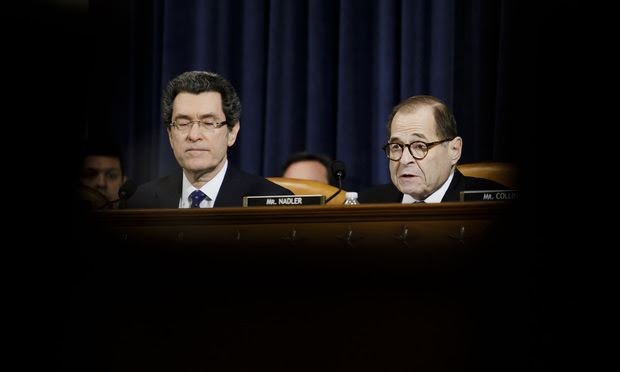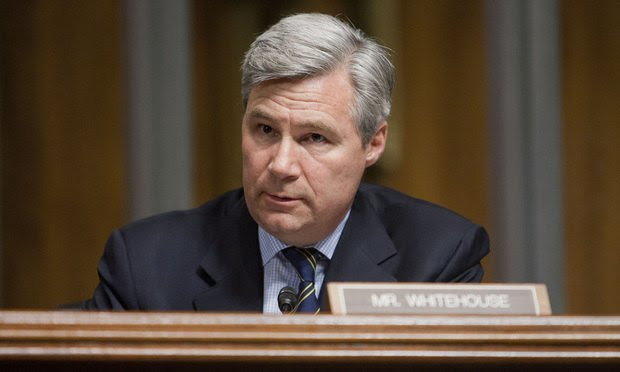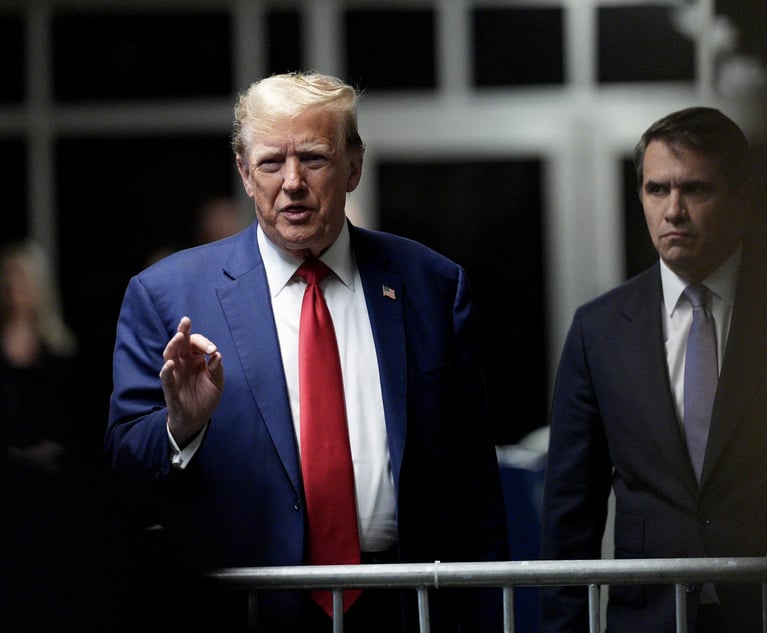Trump Watch: No Impeachment? Dems May Have Other Goals in Investigating Barr's DOJ
What's the endgame for Democrats as they prepare for a hearing with Attorney General William Barr?
July 17, 2020 at 09:56 AM
11 minute read
Hi, and welcome back to Trump Watch. Remember the impeachment trial? That was this year. So was "Tiger King." Anyway, email me at [email protected] and follow me on Twitter at @jacq_thomsen.
 Norman Eisen, left, special oversight counsel to the House Judiciary Committee, sits next to House Judiciary Committee chairman Jerry Nadler, right, during a 2019 hearing on impeachment. Photo: Diego M. Radzinschi/ALM.
Norman Eisen, left, special oversight counsel to the House Judiciary Committee, sits next to House Judiciary Committee chairman Jerry Nadler, right, during a 2019 hearing on impeachment. Photo: Diego M. Radzinschi/ALM.
The Issues and Goals Democrats Have in Investigating Trump's Justice Department.
In less than two weeks, Attorney General William Barr will do something for the first time: Testify before the House Judiciary Committee.
Yep, it's finally happening. And Democrats on the panel have a ton of questions for him: Roger Stone's commutation and recommended sentence, the push to dismiss the criminal information against Michael Flynn, the firing of U.S. Attorney Geoffrey Berman, the force used against protesters in Lafayette Park, allegations over politically motivated antitrust investigations, his comments on mail-in voting, John Durham's review of the origins of the FBI probe into the Trump campaign's ties with Russia, Barr's handling of the release of the Mueller report … and that's not even all of it.
What's abundantly clear is, while House Democrats might believe Barr is dangerous and want him removed from office, they can't. The attempt to remove Trump from office earlier this year resulted in a near party-line vote in the Senate. The appetite to use that power again as expressed by some Judiciary Committee Democrats was formally snuffed out by Speaker Nancy Pelosi last month.
So, all oversight responsibilities aside, what's the point of investigating if there's no real endgame, no way to hold DOJ officials to account?
Sources have pointed to other potential outcomes from investigating. Some speculate about the possibility of an "October surprise" coming out of the Justice Department that could impact the November election. Barr has said Durham is focused on potential indictments, not a report, and that he doesn't believe the indictments would involve the presidential candidates.
"I think it's very important that Congress be ready to not only respond to any of that misconduct, but to prebut it," said Norm Eisen, a former special counsel for the House Judiciary Committee.
"Obviously they need to be ready for an October surprise from Barr and Trump," he added.
If Democrats are trying to argue that any forthcoming indictments from Trump and Barr's Justice Department can't be taken at face value, attempting to build a narrative that the department's political appointees can't be trusted could play a role in that. That effort is bolstered by recent whistleblower testimony from current DOJ attorneys before the committee, as they recounted what they believed to be political actions in the handling of Stone's sentencing memo and in conducting antitrust investigations.
And if the election results are disputed, including by Barr, that same evidence could be utilized in what would be an ugly brawl. Both Trump and Barr have spoken out against mail-in voting—which states could turn to if the pandemic poses too many risks for some to vote in-person come November—but have failed to provide substantive evidence to back up their warnings of potential voter fraud.
"The problem is not that there's not enough to cross examine him," Eisen said. "The problem is there's too much."
At the same time, House Judiciary faces a number of uphill battles in conducting the investigations. An obvious one is the number of topics that are now enveloped by their probe. That breadth alone makes it difficult to focus on one allegation at a time without risking others falling to the side.
That will also pose a challenge when Barr appears before the committee in a couple weeks. Neither Eisen nor fellow former Judiciary counsel Barry Berke will get to question him for an extended period of time as they did impeachment witnesses. Instead, members—24 Democrats and 16 Republicans—will get five minutes each, and not everyone will ask about the specific topics at hand. After all, many members use that time to deliver their own remarks rather than question witnesses.
And will Barr's testimony provide bombshell insights into the Justice Department's conduct?
"I suspect this won't be the kind of hearing with huge, shocking revelations or confessions, and that it'll instead be a hearing where each side scores its hits and moves on," said Joshua Matz, a partner with Kaplan Hecker & Fink who worked for the committee during the impeachment proceedings. He described the committee as featuring "brilliant questioners" with "a clear sense of mission and purpose," but added that Barr is "an exceedingly sophisticated actor" committed to "dodging questions about misconduct and malfeasance."
It's also unclear who else could feasibly be called in to testify before the committee. The Justice Department did allow the two current attorneys to appear, but limited their testimony to specific incidents, meaning they could not provide more in depth insight into the agency. Geoffrey Berman, the former U.S. Attorney for the Southern District of New York, also recently testified but declined to provide information about the office's investigations, citing an agreement with DOJ.
The administration has famously fought, sometimes in court, efforts to hand over documents or provide testimony in House Democrats' investigations. Barr has already been held in contempt once, over DOJ's refusal to provide documents on the failed attempt to add a citizenship question to the 2020 census.
Judiciary Committee and Oversight Committee Chairs Jerry Nadler and Carolyn Maloney have both said they want White House Counsel Pat Cipollone to brief them about Stone's commutation. If anything, those kinds of demands are more likely to spark future clashes than results.
Democrats may want answers, but that's not a guarantee with this administration. But raising questions? That they can keep doing. And we very well could walk out of Barr's testimony and head toward the November elections with more questions than answers.
SPONSORED BY ALM
Announcing Two Incredible Keynote Speakers for the Women, Influence & Power in Law Conference
WIPL is known for having some of the most engaging and energizing keynote speakers attend to share their thoughts, experiences, war stories and tips on effective leadership. And this year is no exception. This year, we are grateful to welcome two remarkable women come and inspire us: Tina Tchen, the President and CEO of the "Times Up" Legal Defense Fund and Paula Boggs, Founder of Boggs Media LLC and Former Executive Vice President, General Counsel and Secretary, Law and Corporate Affairs at Starbucks from 2002-2012. READ MORE
 Sen. Sheldon Whitehouse (D-RI). Photo: Diego M. Radzinschi / NLJ
Sen. Sheldon Whitehouse (D-RI). Photo: Diego M. Radzinschi / NLJ
Senate Democrats Sketch Out Next Moves For Countering Trump Judges
As the House deals with the Justice Department, Senate Democrats are focusing on the president's appointees to the federal judiciary.
This week, Sen. Sheldon Whitehouse and non-Judiciary Committee member Sen. Sherrod Brown sketched out what next steps Senate Democrats will take to further educate Americans about conservatives' "capture" of the courts, after a report they put out on the topic. Next up is talking about the real-life impacts of Trump nominee's decisions, like when voters have to wait in long lines to cast ballots due to court rulings that blocked access to other forms of voting, particularly during the pandemic.
"We have to make those stories poignant and relatable to people's lives," Whitehouse said during an event held by the American Constitution Society's Northeast Ohio Chapter. He said senators like Brown, who don't sit on the Judiciary Committee, will help play a role in getting that messaging out.
In other instances, the senators' hands are tied. When asked about the possibility of a U.S. Supreme Court vacancy ahead of the end of the Trump administration, Whitehouse acknowledged there's not much Democrats could do to stop it.
"If there were a parliamentary trick we could have pulled out of our back pockets, we would have pulled it by now," Whitehouse said. He said Democrats would have to be "hyper-engaged" in that effort, and warned that pushing through a Supreme Court nominee between now and the election could do "enormous damage to the court as an institution."
White House chief of staff Mark Meadows said if a seat on the Supreme Court were to open up, Trump would "quickly" tap a nominee. That's what this list is for, after all.
All of this played out in the context of Justice Ruth Bader Ginsburg's hospitalization this week for a suspected infection. She's home now and doing well, according to a court spokesperson. At least none of the justices were by that flaming car outside the court this week.
 U.S. District Judge Tanya S. Chutkan, pictured at her 2014 confirmation hearing, issued rulings this week blocking federal executions that were ultimately overturned by the U.S. Supreme Court. (Diego M. Radzinschi / ALM)
U.S. District Judge Tanya S. Chutkan, pictured at her 2014 confirmation hearing, issued rulings this week blocking federal executions that were ultimately overturned by the U.S. Supreme Court. (Diego M. Radzinschi / ALM)
What We're Reading
>> How Trump's Judicial Nominees Paved the Way to Restart Federal Executions: "The U.S. Supreme Court's ruling early Tuesday that allowed authorities to conduct the first federal execution in 17 years was the latest of several court orders issued in part by President Donald Trump's judicial nominees in favor of the execution. The fight over the new federal death penalty protocol, announced by Attorney General William Barr last year, was tied up in the courts for several months as attorneys for the men scheduled to be executed argued the new policy was unlawful." [National Law Journal]
>> House to quickly revive legal effort to get Trump's financial records: "The high court ruling appeared to doom Democrats' efforts to obtain Trump's financial records before the 2020 election, with any renewed consideration in the lower courts likely to go on for months. But the House's effort to quickly revive the matter suggests they're still approaching the case with urgency." [Politico]
>> Big Law Rushed to Sue Over ICE's Policy for International Students During COVID. Now Trump Officials Are Dropping It.: "The announcement was made at the start of a hearing Tuesday in the U.S. District Court of Massachusetts, where attorneys with Wilmer Cutler Pickering Hale and Dorr were expected to argue on behalf of officials at Harvard and the Massachusetts Institute of Technology for a temporary restraining order and preliminary injunction against the policy. Instead, U.S. District Judge Allison Burroughs opened the hearing by announcing that attorneys from both sides had come to agreement to rescind that guidance on a national level, which mooted the TRO and preliminary injunction requests." [National Law Journal]
>> Trump DOJ Can't Cut Police Grants to California Sanctuary Cities: "But the U.S. Court of Appeals in San Francisco also said on Monday that its order blocking the Justice Department from withholding assistance to local police in so-called sanctuary cities does not extend nationally. Three other regional federal appeals court have also ruled against the administration policy, but the one in New York allowed it to go forward and on Monday declined to reconsider its ruling. The conflicting appellate decisions makes it more likely the Supreme Court will take up the case at some point." [Bloomberg]
>> In Commuting Stone's Sentence, Trump Goes Where Nixon Would Not: "For months, senior advisers warned Mr. Trump that it would be politically self-destructive if not ethically inappropriate to grant clemency to Mr. Stone, who was convicted of lying to protect the president. Even Attorney General William P. Barr, who had already overruled career prosecutors to reduce Mr. Stone's sentence, argued against commutation in recent weeks, officials said. But in casting aside their counsel on Friday, Mr. Trump indulged his own sense of grievance over precedent to reward an ally who kept silent. Once again, he challenged convention by intervening in the justice system undermining investigators looking into him and his associates, just days after the Supreme Court ruled that he went too far in claiming 'absolute immunity' in two other inquiries." [New York Times]
That's all folks! Thanks for reading Trump Watch, I'll be back next week. Stay safe.
This content has been archived. It is available through our partners, LexisNexis® and Bloomberg Law.
To view this content, please continue to their sites.
Not a Lexis Subscriber?
Subscribe Now
Not a Bloomberg Law Subscriber?
Subscribe Now
NOT FOR REPRINT
© 2025 ALM Global, LLC, All Rights Reserved. Request academic re-use from www.copyright.com. All other uses, submit a request to [email protected]. For more information visit Asset & Logo Licensing.
You Might Like
View All
Legal Speak's 'Sidebar with Saul' Part II: GOP Pols Push Misinformation, Cohen Keeps It Together
1 minute read
Trump Barred From Appearing on Illinois Ballot as Overarching SCOTUS Decision Looms
4 minute read

The Judiciary's Electronic Court System Gets Poor Marks | Plus, A Look at Judicial Noms' Pay
6 minute readTrending Stories
- 1Ex-Prosecutor Denies on Witness Stand That She Tried to Protect Ahmaud Arbery's Killers
- 2Latham's Lateral Hiring Picks Up Steam, With Firm Adding Simpson Practice Head, Private Equity GC
- 3Legal Restrictions Governing Artificial Intelligence in the Workplace
- 4Failure to Adequately Inform Patients
- 5'FTX' One Year Later: The Impact on Examiner Practice in Bankruptcy Courts
Who Got The Work
J. Brugh Lower of Gibbons has entered an appearance for industrial equipment supplier Devco Corporation in a pending trademark infringement lawsuit. The suit, accusing the defendant of selling knock-off Graco products, was filed Dec. 18 in New Jersey District Court by Rivkin Radler on behalf of Graco Inc. and Graco Minnesota. The case, assigned to U.S. District Judge Zahid N. Quraishi, is 3:24-cv-11294, Graco Inc. et al v. Devco Corporation.
Who Got The Work
Rebecca Maller-Stein and Kent A. Yalowitz of Arnold & Porter Kaye Scholer have entered their appearances for Hanaco Venture Capital and its executives, Lior Prosor and David Frankel, in a pending securities lawsuit. The action, filed on Dec. 24 in New York Southern District Court by Zell, Aron & Co. on behalf of Goldeneye Advisors, accuses the defendants of negligently and fraudulently managing the plaintiff's $1 million investment. The case, assigned to U.S. District Judge Vernon S. Broderick, is 1:24-cv-09918, Goldeneye Advisors, LLC v. Hanaco Venture Capital, Ltd. et al.
Who Got The Work
Attorneys from A&O Shearman has stepped in as defense counsel for Toronto-Dominion Bank and other defendants in a pending securities class action. The suit, filed Dec. 11 in New York Southern District Court by Bleichmar Fonti & Auld, accuses the defendants of concealing the bank's 'pervasive' deficiencies in regards to its compliance with the Bank Secrecy Act and the quality of its anti-money laundering controls. The case, assigned to U.S. District Judge Arun Subramanian, is 1:24-cv-09445, Gonzalez v. The Toronto-Dominion Bank et al.
Who Got The Work
Crown Castle International, a Pennsylvania company providing shared communications infrastructure, has turned to Luke D. Wolf of Gordon Rees Scully Mansukhani to fend off a pending breach-of-contract lawsuit. The court action, filed Nov. 25 in Michigan Eastern District Court by Hooper Hathaway PC on behalf of The Town Residences LLC, accuses Crown Castle of failing to transfer approximately $30,000 in utility payments from T-Mobile in breach of a roof-top lease and assignment agreement. The case, assigned to U.S. District Judge Susan K. Declercq, is 2:24-cv-13131, The Town Residences LLC v. T-Mobile US, Inc. et al.
Who Got The Work
Wilfred P. Coronato and Daniel M. Schwartz of McCarter & English have stepped in as defense counsel to Electrolux Home Products Inc. in a pending product liability lawsuit. The court action, filed Nov. 26 in New York Eastern District Court by Poulos Lopiccolo PC and Nagel Rice LLP on behalf of David Stern, alleges that the defendant's refrigerators’ drawers and shelving repeatedly break and fall apart within months after purchase. The case, assigned to U.S. District Judge Joan M. Azrack, is 2:24-cv-08204, Stern v. Electrolux Home Products, Inc.
Featured Firms
Law Offices of Gary Martin Hays & Associates, P.C.
(470) 294-1674
Law Offices of Mark E. Salomone
(857) 444-6468
Smith & Hassler
(713) 739-1250








